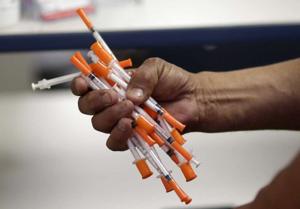Oklahoma legalizes needle exchange programs

(The Center Square) – Oklahoma Gov. Kevin Stitt signed a bill into law that legalizes privately funded needle exchange programs throughout the state for the next five years.
“The legalization of syringe service programs (SSP) is another tool in Oklahoma’s efforts to reduce infectious disease, drug addiction and increase referrals for both mental health and drug treatment,” Sally Bouse, administrative programs manager at Oklahoma State Department of Health, told The Center Square.
Senate Bill 511 allows for government entities including the State Department of Health, nonprofit groups, religious institutions, for-profit companies, non-government entities partnering with a government agency and tribal governments to operate needle exchange programs. The bill prohibits state funds from being used to purchase needles.
“Oklahoma is estimated to have the second-highest prevalence of hepatitis C in the United States,” Bouse said. “Hepatitis C is mainly spread through injection drug use and the sharing of injection equipment. We expect the numbers of new hepatitis C infections to decrease.”
Along with the needle exchange, the law allows SSPs to offer other health services, including: referral and resources to treat substance abuse; education on the risk of transmission of infectious diseases (HIV, hepatitis, etc.); rapid testing for HIV, hepatitis C and STDs; referrals to medical and mental health services; collection of used needles for safe disposal; and distribution of new needles, cleaning kits, test kits and opioid antagonists. Organizations may also provide rapid testing to identify the potency or toxicity of unknown substances.
Needle exchange providers will be required to register with the Oklahoma State Department of Health. Quarterly, they must report the number of clients served; number and type of referrals provided; the number of syringes, test kits and antagonists distributed; the number of used syringes collected; and the number of HIV and hepatitis tests performed along with the number of reactive results, the bill states.
“New users of SSPs are five times more likely to enter drug treatment, and three times more likely to stop using drugs than those who don’t use the programs,” Bouse said. “Also, SSPs help to remove used needles from the community, helping to prevent accidental contact or exposure.”
The Oklahoma Drug and Alcohol Professional Counselors Association (ODAPCA) sees this as a compassionate action in the right direction.
“This act, while not considered to be an actual treatment intervention, has long been considered among other states and nations to be a harm reduction strategy which has the capacity to save the life of those who inject illegal drugs,” Dr. Bill Sharp, president of ODAPCA, told The Center Square. “As the largest professional organization of drug treatment counselors in the State of Oklahoma, ODAPCA appreciates this act which may give an individual who uses illegal drugs one more chance for a longer life as well as an opportunity to find recovery.”
Disclaimer: This content is distributed by The Center Square

